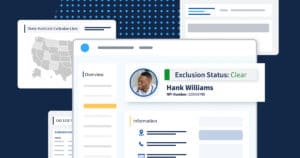License verification, especially nursing license verification, is essential to ensuring that only the most qualified practitioners are seeing your patients. And according to the American Association of Colleges of Nursing, nursing is the largest healthcare profession in the U.S. with more than 3.8 million RNs nationwide. Additionally, of all licensed RNs, 84.5% are employed in nursing. Some additional nursing facts include:
- The U.S. government estimates that >200,000 new RN positions will be created each year from 2016 to 2026.
- RNs comprise one of the largest segments of the U.S. workforce as a whole.
- Most healthcare services involve some sort of care by nurses including private practices, primary care clinics, home health, nursing homes, hospices, and more.
Although license monitoring is vital, verifying healthcare licenses can be extremely complex and time-consuming. And in our current healthcare environment where providers are already stretched thin as COVID-19 continues to surge, staffing shortages remain a key concern, and the enforcement of vaccine mandates is a top priority, providers simply don’t have time to worry about the ongoing evolution of the license monitoring environment. Read on to learn more about nursing license verification in an ongoing pandemic and public health emergency.
License Verification Is Incredibly Complex
Verifying and managing provider licenses is critical to maintaining compliance and to ensuring up-to-date credentialing and accreditation, accurate billing, and patient safety. However, it’s often time-consuming due to the ambiguous license and credentialing landscape:
- Healthcare license verification typically occurs upon hire and at the time of re-credentialing or renewal, but this two-touch approach can leave critical gaps in your assurance of properly credentialed providers.
- State healthcare licensure boards are unique and have their own terms and points of reference for various credentials and license status types. They each make changes at varying points throughout the year. Even verifying licenses every quarter can still result in hundreds of patient encounters under an invalid or expired license.
- There are more than 80 disciplines in healthcare that require a license or certification.
- There are many license status types to be familiar with to conduct proper license verification and ongoing monitoring. Comparable statuses are often referred to differently across boards which can be a challenge for many automated solutions.
- The COVID-19 pandemic made license verification schedules even more challenging when many boards paused or shifted batch expirations.
- While license board data is published at varying intervals and in multiple formats, many boards are increasing their security by adding CAPTCHA and other verification techniques, which adds more time to manual processes and can significantly handicap many automated solutions.
Additional Complexities During The Public Health Emergency
Ever-Evolving License Board Waivers
The COVID-19 pandemic has added to the complexity of license verification. In 2020, during the public health emergency, lawmakers in some states adjusted qualifications and waived requirements for certain healthcare providers with emergency response declarations. Although the Delta variant continues to surge, some states have pulled back their license requirement waivers. For more information about nursing licenses, please refer to the NCSBN State Response to COVID-19. For more information regarding license waivers or expedited licenses for retired physicians, please refer to the Federation of State Medical Boards U.S. State and Territories Expediting Licensure for Inactive/Retired Licensees in Response to COVID-19.
However, to ensure that patients are safe in this emergency response time, healthcare organizations must verify that all licensed providers coming from out of state are not under disciplinary or administrative actions against their license by a licensing agency, in any state, federal, or foreign jurisdiction. Sanctioned or excluded providers are not eligible to provide care to beneficiaries of federal or state healthcare programs.
Interstate Medical Licensure
The Interstate Medical Licensure Compact and NCSBN Nurse Licensure Compact have created more flexibility in interstate and electronic care delivery. While many state medical boards have eased restrictions on interstate licensed providers, these individuals must be licensed to practice in at least one state or territory within the United States. Additionally, as the public health emergency may be extended until early 2022, it’s essential to keep an eye on the continuously changing licensure landscape.
Key considerations after emergency declarations conclude:
- Increased multi-state licensed providers.
- Less friction for obtaining a license in multiple states.
- Increased credentialing and privileging efficiency.
A Second COVID-19 Effect: Staffing Shortages
Providers are facing significant workforce shortages as the pandemic has only exacerbated clinician burnout. According to the American Hospital Association, the recent vaccine mandate could further strain a system that’s already in crisis. Additionally, a recent Mercer report on the U.S. healthcare labor market found that if current trends persist, 29 states won’t be able to meet demands for nursing talent in the next five years, and 24 other states will also face significant shortages. However, some states in the South and Southwest could have surpluses of nursing talent.
Related to staffing shortages and the vaccine mandates:
- The Henry Ford Health System plans to recruit 500 nurses from the Philippines over the next couple of years to solve its ongoing nursing shortage. The system’s already reduced its patient beds by 7% because of the shortage.
- Northwell Health, New York’s largest hospital system, fired 1,400 workers for refusing to get vaccinated. The hospital system’s VP of Public Relations, Barbara Osborn, said, “Having a fully vaccinated workforce is an important measure in our duty to protect the health and safety of our staff, our patients, and the communities we serve.”
- Novant Health, a North Carolina hospital system, fired ~175 unvaccinated employees for failing to comply with its vaccine mandate announced in July. According to Novant, “Less than 1% opted not to comply. We’re proud of the 35k+ team members who chose to participate in the vaccine mandate program with patient safety at the forefront.”
It’s vital to verify a nurse’s credentials from the primary source to ensure they are eligible to provide care. It’s also more important than ever to ensure that all obstacles are removed when it comes to your providers’ ability to care for your patients. Nursing license verification can seem overwhelming with the multitude of primary sources to monitor at any given time, but it doesn’t have to be.
ProviderTrust is here to help so you can focus on what matters most: your patients. Our best-in-class license verification solution provides the most comprehensive end-to-end holistic monitoring with the lowest cost of ownership.









